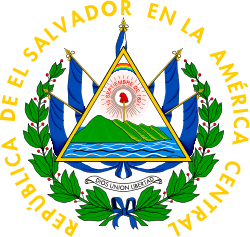Salvadoran general election, 1931
 |
| This article is part of a series on the politics and government of El Salvador |
|
|
Politics portal |
General elections were held in El Salvador on 11 and 13 January 1931. Arturo Araujo won the presidential elections running on a Salvadoran Labor Party-National Republican Party ticket.
Background
Previous elections had usually seen the incumbents choosing their successors, allowing the oligarchy perpetual control of the country's politics. However, on this occasion Pío Romero Bosque failed to designate a successor, resulting in a wide variety of candidates.[1]
Whilst Arajuo obtained a pluraity of the votes, he had failed to secure a majority.[2] However, the newly elected Assembly consisted largely of Arajuo supporters, and when convenen on 12 February, allowed him to assume the presidency.[3] However, Araujo, a landowner with progressive ideals, had the misfortune of taking office in the midst of massive labor and student strikes. Martial law was declared, and soon the military, upset about not having received its pay and supported by the oligarchy, which distrusted Araujo, easily overthrew his government after nine months.[4]
Results
President
| Candidate | Party | Votes | % | ||
|---|---|---|---|---|---|
| Arturo Araujo | Salvadoran Labor Party-National Republican Party | 106,777 | 46.65 | ||
| Alberto Gómez Zarate | Zaratista Party | 64,280 | 28.09 | ||
| Enrique Córdova | National Development Party | 34,499 | 15.07 | ||
| Antonio Claramount Lucero | Progressive Fraternal party | 18,399 | 08.04 | ||
| Miguel Tomás Molina | Constitutional Party | 4,911 | 02.15 | ||
| Invalid/blank votes | - | ||||
| Total | 228,866 | 100 | |||
| Source: Nohlen | |||||
Legislative
| Party | Votes | % | Seats |
|---|---|---|---|
| Salvadoran Labor Party | |||
| National Republican Party | |||
| Zaratista Party | |||
| National Development Party | 34,960 | 3.76 | 0 |
| Progressive Fraternal party | |||
| Constitutional Party | |||
| Invalid/blank votes | - | - | |
| Total | 100 | 42 |
References
- ↑ Grieb, Kenneth J (1971) "The United States and the rise of General Maximiliano Hernández Martínez" Journal of Latin American Studies 3, 2 p152
- ↑ Nohlen, D (2005) Elections in the Americas: A data handbook Vol. 1 Oxford University Press, p287
- ↑ Grieb, p153
- ↑ Bland, Gary "Assessing the transition to democracy" in Tulchin, Joseph S. with Gary Bland (1992) Is there a transition to democracy in El Salvador? Boulder: Westview Press, p 166
Bibliography
- Alvarenga Venutolo, Patricia (1996) Cultura y etica de la violencia San José: EDUCA
- Anderson, Thomas P. (1971) Matanza: El Salvador's communist revolt of 1932 Lincoln: University of Nebraska Press
- Larde y Larín, Jorge (1958) Guía Histórica de El Salvador San Salvador: Ministerio de Culture
- Political Handbook of the world 1931 New York, 1932.
- Vidal, Manuel (1970) Nociones de historia de Centro América San Salvador: Ministerio de Educación. Ninth edition
| ||||||||||||||